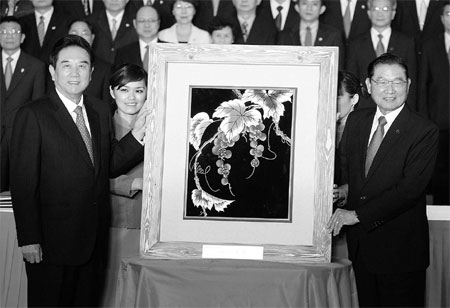Agreements expected to boost cross-Straits trade
Updated: 2012-08-10 08:06
By Tan Zongyang (China Daily)
|
||||||||
|
Chiang Pin-kung (right), chairman of Taiwan's Straits Exchange Foundation, presents a lacquer painting to Chen Yunlin, president of the mainland's Association for Relations Across the Taiwan Straits, in Taipei on Thursday after they signed two agreements to boost investment and customs cooperation across the Straits. Fang Junzhe / for China Daily |
The mainland and Taiwan signed two agreements on Thursday - on investment protection and promotion, and customs cooperation - that will further boost two-way capital and trade flows across the Straits, experts said.
The two agreements were inked in Taipei by Chen Yunlin, president of the Beijing-based Association for Relations Across the Taiwan Straits, and Chiang Pin-kung, chairman of the Taipei-based Straits Exchange Foundation, during the eighth round of talks held since 2008.
The long-awaited investment protection and promotion agreement, which took two years to negotiate, will offer investors from the two sides "just and fair treatment" in matters of personal safety and when settling disputes over investment projects by arbitration.
The mainland and Taiwan pledged to simplify customs procedures, improve the efficiency of customs clearance and enhance the supervision of cargo for cross-Straits trade in order to facilitate the implementation of the Economic Cooperation Framework Agreement.
"The agreements will offer systematic protection of investors' rights and interests," Chen Yunlin was quoted by the Xinhua News Agency as saying.
"It's extremely important, not only for Taiwan's investment and trade links with the mainland, but also for bilateral ties as a whole," Chiang Pin-kung told reporters after signing the agreement.
"It will also provide different ways to protect Taiwan's business interests on the mainland when disputes take place," he added.
In the agreements, the mainland and Taiwan promised to provide equal treatment for investors from both sides.
The two sides published a statement of common understanding on personal freedom and safety issues related to the investment protection and promotion agreement.
The statement said that after detaining a Taiwan resident who works on the mainland for a company that has Taiwan investment, the mainland's police should inform the detainee's relatives within 24 hours. If the relatives do not live on the mainland, police should inform the detainee's employer. The same rules will be applied to Taiwan police.
"The consensus on judicial practice was a major breakthrough. It used to be a tough part of the negotiation," said Ni Yongjie, a researcher at the Shanghai Institute of Taiwan Studies.
Tang Yonghong, a researcher on cross-Straits economic ties at Xiamen University, said the agreements will not only improve protection of investments but also stimulate two-way funding flows.
"Although mainland companies have been allowed to invest in Taiwan since 2009, the investment amount is only about $300 million, far less than the investment that Taiwan people have made on the mainland," Tang said. The investment on the mainland from Taiwan last year alone reached $13.1 billion, according to statistics from Taiwan commerce authorities.
In the new agreements, the two sides agreed to gradually remove restrictions on investment projects, create a fair environment and promote two-way investment. Tang hailed these developments as a stimulus to change the current unbalanced situation.
"If there are fewer restrictions for investment from the mainland, the two sides can strengthen economic and trade cooperation and stand together to fight the global economic downturn."
Ni said the two agreements will eventually contribute to people's livelihoods on both sides of the Straits.
"Under the new customs deal, more fresh fruits can be imported from Taiwan at a faster speed and cheaper price," he said, adding that both exporters and consumers will benefit.
Founded in 1990 and 1991 respectively, the Straits Exchange Foundation and the Association for Relations Across the Taiwan Straits are authorized by the mainland and Taiwan to handle cross-Straits affairs.
The two sides have signed 18 cross-Straits agreements since 2008, ranging from intellectual property rights protection to nuclear safety cooperation.
Xinhua contributed to this story.
tanzongyang@chinadaily.com.cn
(China Daily 08/10/2012 page4)

 Relief reaches isolated village
Relief reaches isolated village
 Rainfall poses new threats to quake-hit region
Rainfall poses new threats to quake-hit region
 Funerals begin for Boston bombing victims
Funerals begin for Boston bombing victims
 Quake takeaway from China's Air Force
Quake takeaway from China's Air Force
 Obama celebrates young inventors at science fair
Obama celebrates young inventors at science fair
 Earth Day marked around the world
Earth Day marked around the world
 Volunteer team helping students find sense of normalcy
Volunteer team helping students find sense of normalcy
 Ethnic groups quick to join rescue efforts
Ethnic groups quick to join rescue efforts
Most Viewed
Editor's Picks

|

|

|

|

|

|
Today's Top News
Health new priority for quake zone
Xi meets US top military officer
Japan's boats driven out of Diaoyu
China mulls online shopping legislation
Bird flu death toll rises to 22
Putin appoints new ambassador to China
Japanese ships blocked from Diaoyu Islands
Inspired by Guan, more Chinese pick up golf
US Weekly

|

|







